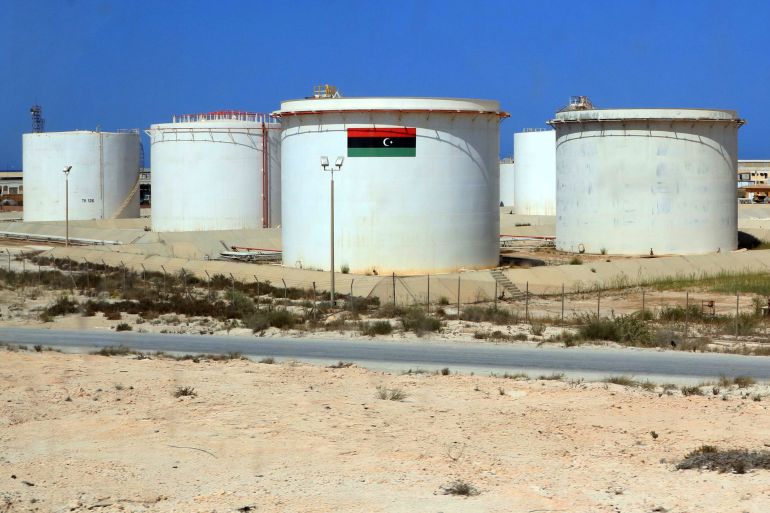Protest forces Libya’s national oil firm to close Al-Fil field
National Oil Corporation forced to halt production after unidentified protesters entered Al-Fil oil field.

Libya’s National Oil Corporation (NOC) has announced the suspension of production at a major oil field in the country’s south, declaring a “force majeure” due to a protest at the site.
Located some 750km (466 miles) southwest of Tripoli, the Al-Fil field is jointly managed by the NOC and Italian energy giant ENI and produces about 70,000 barrels of oil per day.
Keep reading
list of 4 items‘No capitulation’: Russian Wagner group likely to stay in Libya
UN Libya mission uncovers abuse, investigates mass graves
Libya armed groups backing rival PM withdraw from Tripoli
The field was already forced to close temporarily in early March when an armed group shut down valves delivering crude.
“On Saturday… the Al-Fil field was subjected to arbitrary closure attempts, due to the entry of a group of individuals and the prevention of the field’s workers from continuing production,” the NOC said in a post to Facebook on Sunday.
The firm added that the field was shut down on Sunday, marking the second closure in a matter of weeks and “making it impossible for the NOC to implement its contractual obligations”.
Declaring force majeure is a legal move that allows involved parties to free themselves from contractual obligations when factors beyond control, such as fighting or natural disasters, make meeting those obligations impossible.
According to Libya’s state news agency, the closure comes after an unidentified group entered the site and declared that they were halting production “until a government appointed by parliament takes office in the capital”.
Libya has recently found itself again with two rival governments after the eastern-based parliament in February appointed a new prime minister in a direct challenge to the UN-backed government in Tripoli.
Fathi Bashagha, a former interior minister, was named prime minister in February by the House of Representatives, which has been based in Tobruk.
Abdul Hamid Dbeibah, who is based in the capital, Tripoli, has refused to step down as interim prime minister and insists he will hand over power only to an elected government.
Over the past two months, divisions among Libyan armed factions have deepened, with fighters mobilising – especially in the western region – and raising fears that fighting could return after more than a year and a half of relative calm.
Sunday’s forced closure at the Al-Fil oil field comes as the Russian invasion of Ukraine has rattled markets worldwide, causing crude oil prices to soar above $106 per barrel.
Last month, an armed group shut down another critical oil field, Sharara, Libya’s largest, before reopening a few days later following negotiations led by tribal leaders.
Libya’s prized light crude has long featured in the North African country’s civil war, with rival fighter groups and foreign powers jostling for control of what are Africa’s largest oil reserves.
Oil revenues are vital to the economy of Libya.
The NOC is one of the few institutions to have remained intact despite 10 years of violence and lawlessness that have gripped the country since the NATO-backed uprising that toppled longtime leader Muammar Gaddafi in 2011.